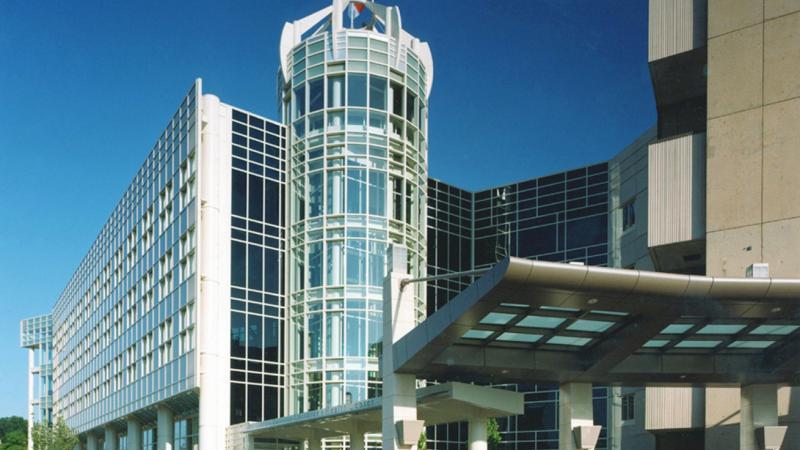
The Beating Heart: Recognizing the Teams Behind the Nation’s #2 Pediatric Cardiology and Heart Surgery Program
The Duke Pediatric Cardiology and Heart Surgery team is a multidisciplinary core comprised of surgeons, physicians, nurses, and experts who are dedicated to working together toward a common goal: providing exceptional care for as many sick children across North Carolina as possible.
In June 2023, that goal was realized in a new way as Duke Children’s Cardiology and Heart Surgery program was named the #2 pediatric heart program in the country by U.S. World and News Report, up five places from the previous year.
Leaders within the program stress what makes recognitions like this possible. It takes a combination of a team of dedicated and talented physicians, researchers, trainees, and clinicians along with an administration that demonstrates its belief in the mission. That mission wholeheartedly supports a drive for innovation and expanding access to care across the state of North Carolina.
The high-risk and complex nature of treating congenital anomalies was what ultimately drove Joseph Turek, MD, Associate Professor of Surgery in the Division of Cardiovascular and Thoracic Surgery, to the specialty.
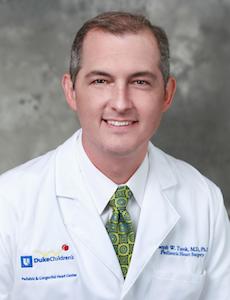
Associate Professor of Surgery
Dr. Turek has served as Chief of Pediatric Cardiac Surgery and Executive Co-Director of Duke Children’s Pediatric & Congenital Heart Center since 2017. An alumnus of the Duke General and Cardiothoracic Surgery Residency programs, Dr. Turek completed his pediatric heart surgery fellowship at the Children’s Hospital of Pennsylvania before beginning his academic surgical career at the University of Iowa.
When the opportunity presented itself to return to Duke six years later, Dr. Turek was excited about the unique prospect to lead and continue building its reputable pediatric heart surgery program.
“We’ve truly been able to build an elite team of over 250-300 surgeons, cardiologists, pediatricians, anesthesiologists, nurses, perfusionists, respiratory therapists, and obstetricians and gynecologists (OB/GYNs), who really do share one common goal of giving every child a chance and work seamlessly together to make that happen,” Dr. Turek says.
The Force of a Fist
Dr. Turek recognizes the responsibility that he and members of the pediatric heart team are entrusted with by families and their children, often before the babies are even born.
“A lot of congenital heart disease is diagnosed prenatally,” explains Dr. Turek. “So, we as the surgeons are able to get to know the mother when they’re pregnant, and get to know their child’s condition and start to develop that relationship early on.”
Because of the nature of these cases and conditions, the surgical team works closely with the OB/GYN teams, along with the fetal cardiologists and prenatal nurse coordinators.
“We work with all of these folks to talk about the delivery of the patients—the mothers—and discuss when it would be best and most desirable to have them deliver,” Dr. Turek says. “It’s a really coordinated effort at all times.”
"It's almost like a fist; all of the fingers have to be in coordination with each other to form a very strong force."
-Veera Allareddy, MD, Professor of Pediatrics
One of the mechanisms to that efficient collaboration, Dr. Turek explains, is the establishment of different protocols for how to treat different types of patients in an effort to optimize outcomes.
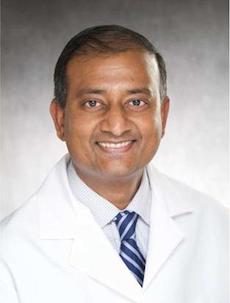
Professor of Pediatrics
A key driver in the development of such protocols and consistent, systems-based practices has been Veerajalandhar Allareddy, MD, Professor of Pediatrics and Chief of the Section of Pediatric Cardiac Care, whom Dr. Turek recruited to Duke in 2018 after their time spent working together at Iowa.
“There was tremendous potential here to build a strong pediatric cardiac program, with collaboration across five main areas, namely cardiothoracic surgery, cardiology, critical care, anesthesia, and the hospital administration,” says Dr. Allareddy on why he decided to join the team at Duke.
“It’s almost like a fist; all of the fingers have to be in coordination with each other to form a very strong force,” Dr. Allareddy describes. “At the end of the day, this is a team effort. Caring for these neonates with heart disease is extremely challenging, and we have to have a unified approach.”
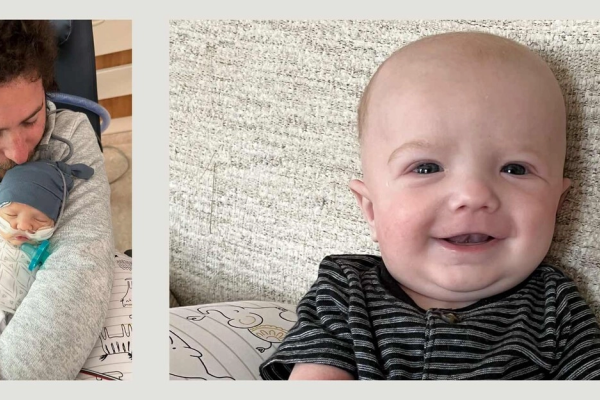
Duke Health News: Duke Health Performs World’s First Partial Heart Transplant
Fostering A Culture of Talent
Drs. Turek and Allareddy know, though, that the teams at Duke were historically doing great work before they were both recruited to the program.
“The pediatric heart program has always had good culture and thought of ourselves as an elite program, and I think that mindset has grown after we’ve delivered excellent results year after year,” says Dr. Turek.
Dr. Allareddy agrees. “We always had talent,” he says. “It’s just that we needed more talent, and we have been successfully able to hire more people with similar philosophies and each with their own intrinsic skill set, and develop an even stronger team.”
"There are numerous opportunities with the CT fellows and medical students to teach them about congenital heart disease, the physiology, and repair options."
-Douglas Overbey, MD, Assistant Professor of Surgery
Growing a program and its talent pool has also involved the establishment of a new training program, the Congenital Cardiac Surgery Fellowship, of which there are only a handful in the country. Headed by Dr. Turek, the fellowship is designed to develop an autonomous pediatric heart surgeon in the full spectrum of congenital operations.
In 2023, the fellowship had its first graduate: Douglas Overbey, MD.
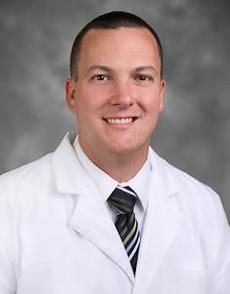
Assistant Professor of Surgery
After completing his adult cardiothoracic surgery fellowship at Duke, Dr. Overbey was presented with the opportunity to continue his world-class training experience as the first congenital cardiac fellow at Duke.
What drew Dr. Overbey to the sub-specialty was the uniqueness and range of complexity of each case. “In many cases, the surgical corrections we perform can lead to a normal physiology and lifespan for a child, which is extremely rewarding,” says Dr. Overbey. “Seeing the kids enjoy their normal lives as they leave the ICU, and hearing about their activities after discharge, knowing that they are out playing, growing, and being joyful with their families is extremely fulfilling.”
In this new fellowship, he was able to continue to develop his operative skills and begin a meaningful academic career under the mentorship and guidance of Dr. Turek and other cardiothoracic (CT) surgery faculty, while also growing as a mentor to surgical residents and trainees in his own right.
Now a member of the Duke faculty himself as Assistant Professor of Surgery, Dr. Overbey recognizes the importance of generating enthusiasm among trainees about the future of such a small, specialized field.
“Education is a core component of our academic mission,” says Dr. Overbey, “and there are numerous opportunities with the CT fellows and medical students to teach them about congenital heart disease, the physiology, and repair options.”
Seeing the success that his first graduate of the congenital cardiac surgery fellowship has had, Dr. Turek is excited about the future of the program and welcoming and developing new congenital heart surgeons who will contribute greatly to the care of children within and outside of Duke.
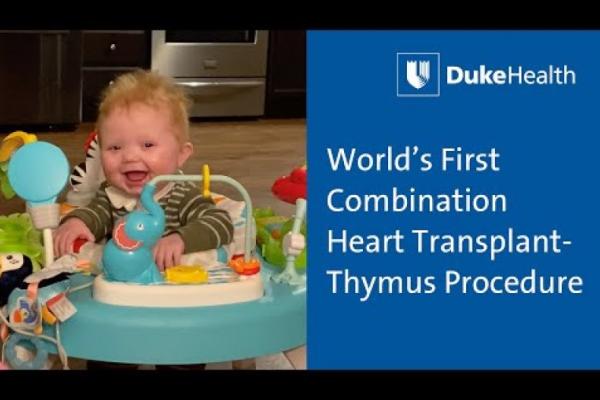
Duke Health News: Baby Receives World’s First Combination Heart Transplant/Thymus Procedure
Support Breeds Innovation
Along with Drs. Allareddy and Turek, other executive leaders within the pediatric cardiac program have included: Kevin Hill, MD, Chief of Pediatric Cardiology; Salim Idriss, MD, Cardiologist; Alex Rota, MD, Chief of Pediatric Critical Care; Jennifer Li, MD, former Chief of Pediatric Cardiology; and Kelly Ellington, Clinical Operations Director for Duke Children's Hospital.
With a leadership team this diverse in specialty and background, the program was built on a foundation of resources and support to lead, innovate, grow, and provide the care that patients across the state need.
"We're delivering care that's unparalleled to anywhere else."
-Joseph Turek, MD, Associate Professor of Surgery
Over the past six years, the Duke Pediatric Heart Surgery program has not only been able to treat a record number of patients, but its teams have also been at the center of leading some of the world’s most novel, innovative surgical procedures for some of the most complex cases.
“Innovation has been a huge driver of our success and it’s what, I think, separates us from other pediatric care programs in the country,” says Dr. Turek.
“The work we’re doing in the world of partial heart transplantation, donation after circulatory death (CDC), thymus-heart co-transplantation, it’s really cutting-edge work in our field and we’re definitely leading the way in the country.”
Innovation at Duke is due largely to strong support from all levels of leadership and administration, with an emphasis on making sure that everyone is working instinctively with the mission and vision of the hospital.
“Not a lot of places would have stuck their neck out for us with certain ideas and research efforts and said, ‘This is a great idea, we trust you and we think this could be good for the care of children,’” Dr. Turek explains. “The procedures that we’ve been a part of are due to how our entire team has really bought in to what we do, and we’re delivering care that’s unparalleled to anywhere else.”
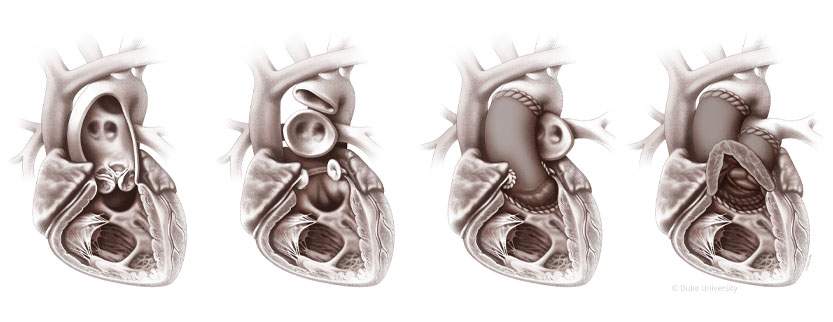
A Kids-First Mentality for NC
The team at Duke recognizes that they have an opportunity not just to elevate Duke’s status as a premier pediatric care provider, but to also establish meaningful, impactful collaborations with other academic medical centers across the state, allowing patients and their families to receive quality care regardless of whether they live in the immediate Durham area.
When Dr. Turek first returned to Duke, the team began a collaboration with East Carolina University (ECU). The Duke team provides all pediatric cardiac care at ECU Health, doing case conferences with the patient’s cardiologists and providing back-up for the catheterization laboratory in Greenville, and returning to provide the surgical care at the Duke facilities in Durham.
"The team that we've compiled is very special and we're hoping to continue to deliver this kind of work for years to come."
-Joseph Turek, MD, Associate Professor of Surgery
After the success of the collaboration with ECU, Dr. Turek reached out to the UNC Children’s Hospital in Chapel Hill about a similar partnership.
“Over the last year, we’ve been able to work together with UNC and realize that this is the best thing for the kids in the state,” Dr. Turk explains.
With a kids-first mentality, three major academic healthcare institutions are now working together to bring high-quality surgical and cardiac care to children in all corners of the state.
“We work so well together with these programs and are trying to do the right thing for our state, and we really are able to provide the best outcomes in America over the last five years,” says Dr. Turek.
These outstanding patient outcomes, growth and expansion of the team, establishment of new education and training programs, and support from all levels to engage in cutting-edge research have paved the way for the Duke Pediatric Cardiology and Heart Surgery program to rise to new heights and be nationally and globally recognized as a leader in the field.
“These are some of the most complex surgical cases that exist,” Dr. Turek continues, “and the team that we’ve compiled is very special and we’re hoping to continue to deliver this kind of work for years to come.”
Dr. Allareddy is also enthusiastic about the future of the program. He says, “We have a very diverse group of people who have done remarkable work over the past several years, and we know that we can get better every day. We always have more to learn and more to achieve.”